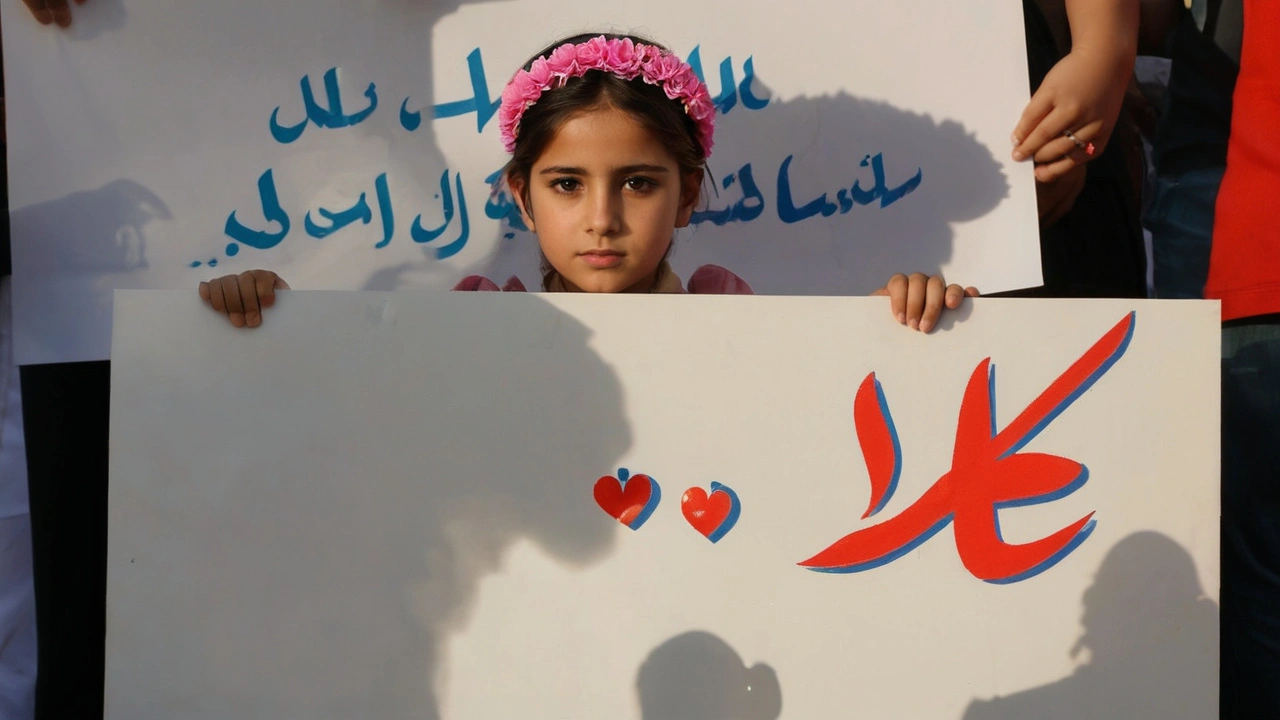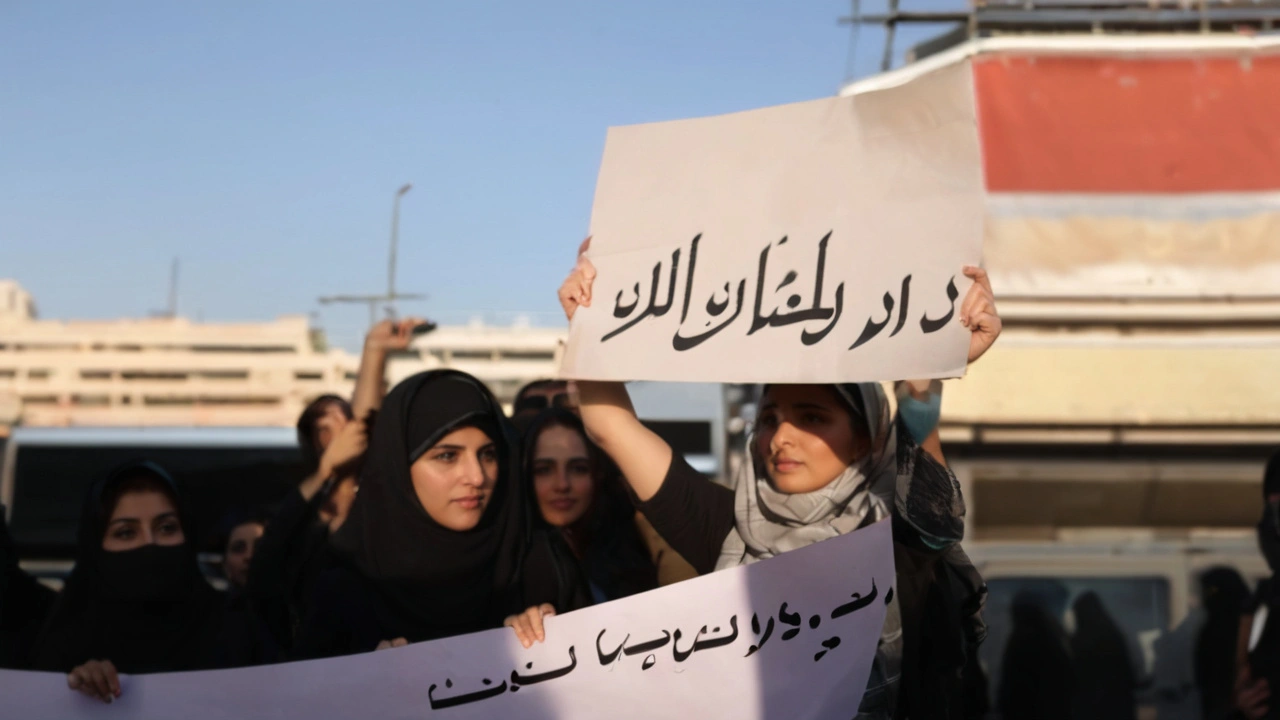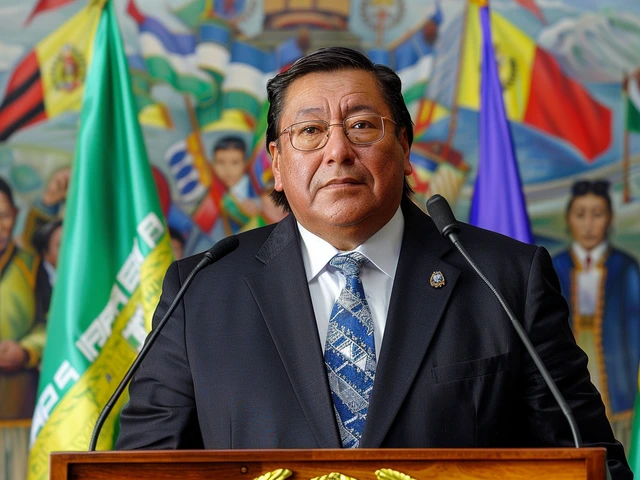Proposed Legislation Sparks Protests Across Iraq
In a highly controversial move, a proposed piece of legislation is currently making its way through the Iraqi Parliament, causing widespread uproar and intense protests across the nation. Activists and women's rights organizations are condemning the legislation, which they argue would undermine the basic rights of women and children, specifically by allowing child marriages. The proposed law empowers religious leaders to have the final say on family matters such as marriage, divorce, and child custody. This fundamental shift has triggered concerns that it might lead to far-reaching and damaging societal implications.
Concerns over Legalizing Child Marriages
Critics are particularly alarmed by the potential for the law to allow girls as young as nine to marry, a move they say equates to legalizing child rape. Under current laws, marriages for individuals under the age of 18 have been prohibited since the 1950s. This change would not only reverse decades of progress but would also severely impact the lives and futures of countless young girls. Raya Faiq, who coordinates a coalition opposing the legislative change, has vocally highlighted the potential for devastating and sweeping impacts on women's rights and family dynamics. The proposal’s first reading has already passed, heightening the sense of urgency among opposing groups.

Resistance from Activists and Lawmakers
The proposed legislation has faced significant resistance from various groups, including a dedicated contingent of 25 female lawmakers who are striving to prevent the bill from advancing further. Demonstrators have taken to the streets to voice their fears and frustrations, emphasizing that if enacted, this law could subject children to harsher conditions and strip them of legal protections that were hard-won in earlier decades. The role of religious leaders in overseeing essential family matters evokes significant debate about the balance between religious customs and modern legal frameworks.
Political Backdrop: The Coordination Framework
At the heart of this legislative push is the Coordination Framework, a coalition made up of factions aligned with Iran. Since gaining influence in 2021, this group has successfully enacted various laws that enforce a strict interpretation of Sharia. Some of these laws include recognizing specific religious holidays and criminalizing homosexuality and transgender identities. Nadia Mahmood, co-founder of the Aman Women's Alliance, explains that these political entities feel threatened by the increasing empowerment of women and are systematically working to curb their influence in society. This broader political context adds complexity to the passage of this controversial law, illustrating a clash between progressive ideals and conservative values.
Impact on Women’s Empowerment and Child Welfare
The implications of this legislative change stretch far beyond the immediate concern over child marriages. Women’s rights activists argue that sanctioning such laws would be a significant setback in Iraq's gradual journey towards gender equality. A UNICEF survey has already revealed that 28% of girls in Iraq marry before reaching adulthood, a troubling statistic that activists fear could rise dramatically if the proposed law is enacted. Campaigners maintain that the legislation would not only undermine existing protections but would also give rise to a range of other social issues, such as higher school dropout rates, increased poverty, and poorer health outcomes for young mothers.
Future Prospects and Advocacy Efforts
Despite mounting opposition, supporters of the proposed legislation argue that it aligns with the Iraqi constitution and is consistent with the constants of Sharia and democratic foundations. However, critics remain steadfast in their belief that the law would be disastrous for women and children alike. As the bill approaches its potential second reading, various groups and organizations are working tirelessly to raise awareness and mobilize public opinion against it. Their relentless advocacy efforts aim to safeguard the rights of women and children and prevent the erosion of legal protections that many fought so hard to establish.
Through this unfolding legal battle, the future of Iraq's legislative landscape regarding family law hangs in the balance. The outcome will undoubtedly set a precedent, impacting not only the lives of countless individuals but also shaping the broader societal norms around gender equality and children's rights in the country.







Comments
Linda Lewis
August 10, 2024 AT 04:38 AMThis is horrifying.
Lea Ranum
August 11, 2024 AT 12:00 PMI can't even breathe right now. Nine-year-old girls being forced into marriage? Like... are we in the 12th century? This isn't religion, this is abuse dressed up in robes. And the fact that religious leaders get to decide who gets to be a parent? That's not freedom, that's a death sentence for girls. I'm crying. I'm so angry I can't type straight. This is the kind of thing that makes me want to move to another planet.
Pinkesh Patel
August 12, 2024 AT 08:54 AMu know what... this is just westen propaganda... islam dont allow child marriage... its the cultural thing... u dont understand... its not law its tradition... and u westerners always think u r better... lol
Jason Frizzell
August 14, 2024 AT 01:26 AMI get that tradition matters, but when tradition harms children, we have to question it. I don't know much about Iraqi law, but if a nine-year-old can be married, that's not culture-that's a human rights crisis. Maybe there's room to honor faith without sacrificing safety?
Ethan Steinberg
August 14, 2024 AT 06:46 AMAmerica thinks it owns morality now? Cool. Meanwhile, we're letting boys grow up without fathers and girls turn into social media zombies. At least in Iraq, they still know what family means. This isn't child marriage-it's community. You don't get to lecture us from your bubble.
Steve Williams
August 15, 2024 AT 23:44 PMThis bad. Child marriage no good. Girl too young. She need school. Not husband. This law stupid.
Andy Persaud
August 17, 2024 AT 15:20 PMAnother woke mob screaming. Whatever.
ANGEL ROBINSON
August 18, 2024 AT 17:13 PMThis isn't about religion. It's about power. When you give one group the authority to decide who can marry, who can divorce, and who gets custody-you're not protecting faith. You're building a system of control. And history shows us that systems built on controlling women and children don't last. They collapse under the weight of their own cruelty. We’ve seen this before. We can’t pretend this is about tradition. It’s about fear. Fear of women speaking up. Fear of girls choosing their own futures. And fear is never a good foundation for law.
Deborah Canavan
August 20, 2024 AT 15:44 PMI mean, I’ve been following this for a while, and honestly, it’s kind of a mess. The Coordination Framework has been pushing a lot of these ultra-conservative laws since 2021, and it’s not just about marriage-it’s about eroding secular institutions piece by piece. You’ve got women’s groups protesting, you’ve got lawmakers trying to block it, you’ve got UNICEF data showing 28% of girls already married underage, and now this? It’s like watching a slow-motion train wreck where everyone knows it’s coming but no one can stop it. And the worst part? People outside Iraq are screaming, but the people inside are just exhausted. They’ve been fighting this for years. The protests aren’t new. The fear isn’t new. The law just makes it official.
Thomas Rosser
August 21, 2024 AT 02:54 AMThis is all a CIA psyop. 😏 The real agenda is to destabilize Iraq so the US can control the oil. Child marriage? Nah. That’s just the cover. Look at the timing-right before the elections. Coincidence? I think not. 🤫
Joshua Johnston
August 21, 2024 AT 09:37 AMPeople say 'it's cultural' like that excuses abuse. Culture evolves. Laws should protect the vulnerable, not enshrine cruelty in the name of heritage. If your faith requires a child to be married, maybe it’s time to rethink your faith.
Kerry Keane
August 22, 2024 AT 09:15 AMthis is so wrong i cant even... girls need to go to school not get married at 9... why are they even doing this... just sad
Elliott martin
August 22, 2024 AT 22:07 PMI wonder how many of the people supporting this have actually talked to girls who’ve been forced into marriage... like, what’s their life like after? Do they get to keep learning? Do they get to be kids? I just... I can’t imagine
Shelby Hale
August 22, 2024 AT 22:38 PMOhhh so now we’re going to let nine-year-olds become brides because some men in robes say so? How poetic. The same men who tell women to cover up, then demand they be fertile by age 10. What a beautiful world we live in. 💀
Jeffrey Frey
August 23, 2024 AT 17:01 PMThis is exactly what happens when you let religion run the state. 🤡 The moment you let zealots dictate family law, you’re signing death warrants for girls. And don’t even get me started on how they’ll gaslight everyone into thinking this is 'freedom of belief.' No. It’s freedom to rape children under the guise of God. And the fact that people still defend this? I’m done.
Jeremy Ramsey
August 24, 2024 AT 14:47 PMLook, I get that traditions matter. But when the tradition is turning a kid into a wife? That’s not culture. That’s a crime. And if your holy book says one thing but your community’s doing something worse? Maybe the book’s not the problem. Maybe it’s the people reading it.
Henry Huynh
August 25, 2024 AT 10:46 AMwhy is everyone so mad its just a law